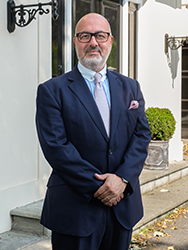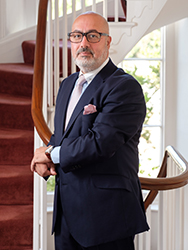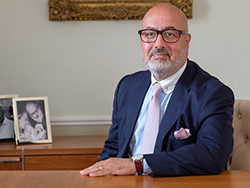 As Mort Mirghavameddin approaches his first anniversary as CEO of Trust Corporation, reflecting on the past 12 months it is clear he’s ready to put his foot down and deliver on a new strategy he believes will enhance the Guernsey-based company
As Mort Mirghavameddin approaches his first anniversary as CEO of Trust Corporation, reflecting on the past 12 months it is clear he’s ready to put his foot down and deliver on a new strategy he believes will enhance the Guernsey-based company
What’s your background and how did you get to where you are now?
I was originally awarded a scholarship to go and study quantity surveying in Portsmouth, but I quickly realised that a career in financial services was going to be more rewarding.
Bear in mind that I am one of Thatcher’s children. It was a matter of getting on your bike and getting on with it. And in those days, as a 20-year-old, it was drummed into you that you had to get on the property ladder and that was the primary motivation.
My career in financial services started at the London Stock Exchange in 1986, which was the time of the Big Bang. I was in a department called Membership, which essentially was allowing the ownership of British stockbroking firms, for the first time, to be outside of the UK.
Subsequently, the regulatory environment came to be and a regulator was established. Most of us, who had worked at the London Stock Exchange, were assumed into a company called The Securities Association, which was really the very first regulator of stockbrokers and bond dealers under the umbrella of the Securities Investment Board.
What was it like to work in the City at the time of the Big Bang?
It was a fantastic time because it really was a Big Bang. The floor of the London Stock Exchange, the options traded on the side, the floor of LIFFE – there was much more human interaction on the floors.
Working in the Stock Exchange building itself was exciting, aside from the IRA bombs that were going off every now and then. The visitors’ gallery bomb happened during my time at the Stock Exchange, as did the Commercial Union bomb.
So, aside from outside influences, it was a massively exciting time of change. The Americans, Japanese, Germans, French were all coming in. It really created a very diverse environment.
By 1995, people were beginning to hire ‘professional’ compliance officers and I was headhunted to join Guinness Mahon. I was Group Head of Compliance at a very young age – 29 years old – and two years after that we were taken over by Investec Group, which asked me to head up their group compliance department.
I continued in this role for a further two years and was then invited by the Chief Executive of Investec Group to consider taking up a role as Chief Executive of Investec Bank in the Channel Islands.
My initial thoughts were: “I’m in compliance; I haven’t got the knowhow of the commercial aspects of banking”. However, inspired by his belief in me, I took up the position and in 2000, the year of the millennium, I came to the Channel Islands at 34 years old.
How did you feel about being a CEO at that age? Was it daunting?
I think I was probably the youngest Chief Executive of a bank on the island at the time. I recall the table at the Association of Guernsey Banks – I was definitely the youngest person there.
With the firm at a low ebb, the only way was up. For me, it was an opportunity to create something that was an improvement on what was before, so I never really looked at the downside of things.
Plus, I felt I had a bit more energy and was more hungry to succeed than, with respect, some of the other incumbents who were comfortable in their surroundings.
Were they surprised to be dealing with such a young CEO?
To be honest, I’m not sure what their impressions were. I just thought about who we were and how we could win. The way to win is to create the rules of the game yourself and if you play by your own rules, you win. That was the outlook we instilled in the team.
I believe Investec Bank Channel Islands was originally established to be the banker for the in-house asset management company so, since inception to the time that I arrived, it was a service provider to another part of the group that was doing well. When I arrived, we decided that it ought to stand on its own two feet and create profitability for the shareholders in a manner that was acceptable.
Our vision was that we would like to double the size of the bank every four years. We were making roughly £1m a year when I arrived; we were making roughly £24m a year when I left in 2009.
 How did you make that happen?
How did you make that happen?
The secret of the success was to have a clear, strategic direction and to have a group of people who absolutely believed in that. The culture and values at Investec created an environment that allowed ordinary people to perform extraordinarily.
I wouldn’t say we were any better in terms of qualifications or entrepreneurial skills than any other bank around in the market, but as a cohesive team, I would have put us up against anybody and be confident we could win. I think that sense of confidence is what really created our differentiator.
As an example, relatively early on in my time there, we went away on an offsite trip and people from the various departments put down what in business-speak you might call ‘big, hairy, audacious goals’ – and some of them were laughable. Let’s say the lending book was £28m and the Head of Lending said, “I’d like to be at £200m” – that was a tenfold increase. But not only did we smash the £200m, I think we achieved £700m towards the end.
Why did you leave Investec?
We had achieved our goals, and I noticed a gap in the market, where the banks had retreated from providing credit finance. I saw an opportunity to set up a credit fund dealing with real estate financing.
We were probably the first real estate credit fund that provided mezzanine finance at the time. Unfortunately, I think we were too early. Now, there are probably 200 such funds, but we were the first and investors didn’t really understand the opportunity.
The company’s still going today and I’m told it’s built up quite a substantial sum, so things did turn around in a nice way.
I was then offered the opportunity to lead a Jordanian bank based in London, called Jordan International Bank. Again, this was what appeared to be a turnaround situation, a bank that had floundered for many years. It probably had a net loss of £36m between the 1980s until the day I arrived. During my six years there, my team and I gave back the shareholders their £36m of losses.
I then took a little break, as my wife and I had our first child. And then in October 2018, Trust Corporation rang and asked me to come and be their new CEO.
In a nutshell, tell us what Trust Corporation does.
Trust Corporation was established 16 years ago by three lawyers from Wedlake Bell – Mike Betley, Mike Heyworth and Jon Plimley. We’re an independent trust and fiduciary company. We look after the affairs of high-net-worth individuals. We administer offshore companies, naturally in accordance with substance rules. Last but not least, we also have a fund administration operation. We look after some private equity funds ranging from midsize to, say, more than $2bn.
What would you say is your unique selling proposition (USP)?
The fact that our founders have come out of private practice and understand on a very technical basis the detail of what’s being proposed creates a USP for us. The ratio of directors to clients here is formidable, as is the hands-on approach – directors see and sign everything that goes out of the firm.
There is a good balance of delegation, but responsibility sits with the people who work and direct the business. Attention to detail is fantastic, so in terms of errors, litigation or claims on insurers, there isn’t any of that.
The relationships are much deeper here than in many companies I’ve seen. The response times are quicker. Also, the fact that the lawyers have been in private practice means they can collaborate with our key advisers to create innovative planning techniques.
How important is independence to your proposition?
On the one hand, being independent is great because we’ve been to a number of pitches recently where one of the first questions was: “Are you independent?” They’re asking because there have been some bad private equity investments in the sector and the stories have permeated across the industry. There is probably good private equity out there too, and there are other good third-party investors, such as family offices or patient capital. So independence is positive on the one hand because it allows you to win more business.
On the other hand, if you’re supported by a wall of money behind you, as we have seen recently with some of the other now non-independent offerings, they can go and pick and buy various assets across various geographies and enlarge their overall geographical and general offerings.
Would you consider giving up your independent status at some point?
We have been approached on numerous occasions, because we’re considered one of the best, if not the best, of the midsize independents. Our employees are first class, from the director down, so if you want a firm without any compliance complications or skeletons in the cupboard, certainly Trust Corporation has maintained a brilliant record to date. If we were put on the market, I think somebody would snap us up relatively quickly.
However, we will probably rule it out at the moment. Our people are confident enough to deliver on our strategy. If we do ever consider this, it’s more likely to be with somebody that fits with us culturally and strategically, and has a very long-term view that would benefit us and our clients.
We wouldn’t enter into a relationship with a third party lightly. I wouldn’t rule it out, but I wouldn’t say it’s for tomorrow.
One of your first tasks as CEO has been to conduct a review of the company’s strategy. What sort of conclusions have you drawn from this review?
We’re currently reviewing which niches of the business we can really enhance and put on the front foot.
The darling of the market at the moment is the fund administration area, so there is obviously going to be a bit more emphasis there. There will probably be more activity in the corporate and substance arenas, but don’t be surprised if we do things that are not necessarily historically or particularly recognisable in the trust sector.
I don’t want to let the cat out of the bag, but we shall be looking at other symbiotically linked activity that will enhance our offering.
However, the review is not concluded. We’re looking at strategy, operations, systems, IT, people – the whole shebang. That will probably take us through to October, after which we must put our foot down and deliver. What is mission-critical is to ensure that we continue our practice of hiring the very best people who can talk to existing and potential clients as equals rather than subordinates. We’ve got to try and continue to hire very, very good practitioners. That’s our challenge.
 What are the challenges for the trust sector as a whole?
What are the challenges for the trust sector as a whole?
Tax transparency across the globe is an issue that needs careful consideration. The days of tax planning or tax-led initiatives are numbered, I would say. It’s much more about the political landscape around the world. Certainly in the emerging economies – Russia and the Middle East – quite a lot of asset protection is coming to the fore. So structures will be more about what I call traditional trusteeship than tax-based trustee offerings.
I think succession planning is becoming much more important too. The newer generation of money has a completely different outlook to the older generation of money. The activities of the beneficiary will be different to those of the settlor, who may have had a preservation outlook. But the beneficiary may want to be giving and gifting and engaging with green initiatives or philanthropy in a meaningful manner.
We as a firm have got to be aware of that – if we are not and we carry on in the traditional manner, we may find ourselves withering on the vine. Part of our strategic review is to create an environment in which we can get much closer to our clients and the next generation.
Is Brexit a challenge for Trust Corporation?
It’s not an issue for Trust Corp per se, but it could be an issue for Guernsey at large. Let’s assume the worst-case scenario for the moment – that Britain crashes out of the EU with no deal whatsoever. If you’ve got a situation where there are potentially 10 years of hardship, then I can see the UK becoming an offshore centre to the rest of Europe itself.
I can see it really usurping the Channel Islands. Whether or not that creates a scenario in which Guernsey is irrelevant is what exercises me personally. I don’t think it will ever get to that, but that’s my ‘elephant in the room’.
Does the recent change in leadership in the UK give you confidence that Brexit will be a well-managed process?
As far as Mrs May and Brexit were concerned, it was a bit like asking a vegan to be in charge of the meat board. Whilst Boris may not be palatable to most, he was elected in his own democratic party’s way. He did believe in Brexit from the get-go and at least he’s going at it on the front foot – rather than what happened with Mrs May, which is that our European friends and allies felt they had a soft touch in her, and we are where we are three years down the line and not one inch further forward.
Ideally, you want to have a deal. One should be concerned that Boris has put a red line in the sand, even if it gives him some strength in negotiations. If it’s a bluff, the issue is whether the bluff will be bought by the Europeans or not.
Trust Corporation is a Guernsey-based business. Do you share the concerns of some business leaders on the island that a lack of transport links is hurting it?
When I first arrived in Guernsey, British Airways used to come here. Flybe has increased its flights to Heathrow, which is a positive, but it has taken away the other routes, which is a negative. Going Aurigny – I’m really sorry to say this, but I find even spelling Aurigny for the outside world quite difficult. Tiny things like that just create more barriers.
You do hear that sometimes clients justify where they’re going to put a piece of business, based on whether there’s a flight that’s convenient to them from Heathrow to wherever they need to get to. If that link doesn’t exist, it’s a negative against Guernsey. So, personally, I would like to see more flights around what I regard as business hours.
You’re about to hit your first anniversary as CEO of Trust Corporation. How are you reflecting on this?
This is probably the first time I’ve come into a situation where the firm wasn’t in a holding pattern, at best. This is a firm that’s grown from nothing to where it was when I arrived, so it’s doing well. My challenge is to take that group of people, provide them with practical tools and techniques and inspire them by creating a vision and a journey that’s palatable to them. Year two will be about embarking on that journey.
FACT FILE
Name: Mort Mirghavameddin
Age: 53
Position: CEO, Trust Corporation International
Home town: London
First job: London Stock Exchange
Family: Wife, 19-month-old daughter
Hobbies: Golf
Did you know: I left Iran for the last time at the age of 15 in 1980 and can empathise with some of the world’s refugees